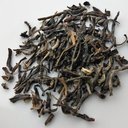China WuYi Mountain Tea
This tea has been retired/discontinued.
 |
|
Commercial Description
...grown in the mountainous region of the WuYi mountains 1,500 meters above sea level. Even though it is a green tea, it is allowed to ferment briefly which results in the dry leaves having a dark hue. This premium quality Chinese green tea has a sweet and floral aroma, light green colour and a smooth taste.
Ratings & Reviews
Page 1 of 1 page with 1 review
 78 Aroma: 8/10 Flavor: 5/5 Value: 4/5
78 Aroma: 8/10 Flavor: 5/5 Value: 4/5Alex Zorach (1453 reviews) on Dec. 4th, 2018
After being disappointed with Organic Herbie's other teas, I was a bit apprehensive about trying this, but I turned out to like it a surprising amount. I also notice an inconsistency in the marketing: the description says it is grown in the Wuyi mountains, which are located in Fujian province, but the website says that it is produced in Zhejiang province. Which is it? One of these is clearly an error, unless it is somehow exported and processed in a different region, in which case I think it would be important to clarify the inconsistency.
I'm also curious about the description; it says that "it has been allowed to ferment briefly". Is this really a yellow tea? Is "fermented" being used to mean "oxidized", the way this term is sometimes sloppily used in older tea circles in the West? Or is this more of an aging process like some Pu-erhs go through? The description is vague and leaves me unclear.
The leaf looks finely broken, not a good sign. The leaf though is very fragrant, pleasing, and complex. I get a hint of smoke, floral notes, and a strong smell of hay or straw. There are hints of mushroomy notes that I usually only encounter in aged Pu-erh. The smell is fresh, light, and very pleasant, making me more eager to try this tea than the appearance of the leaf did.
The brewed cup really tastes like Pu-erh: very young, raw Pu-erh, both with the harshness or edginess of the cup, and some of the characteristic aromatic notes: a hint of smoke, some mushroomy notes. Flavor is lightly bitter, sour, and savory: there isn't much sweetness except perhaps in the aftertaste or as drinking a lot of it, and then it hints at sweetness. The mouthfeel is pleasant and full-bodied, although at times a bit too astringent. As I drink more of the cup, it has a bit of a "dirty" or "barnyard" aroma, possibly from the hay/straw quality to the aroma.
I enjoyed it, but this tea tastes like it could be aged another few years before being consumed. The resemblance to Pu-erh is uncanny. If you brewed this and gave it to me without telling me anything about it, I'd probably guess that it was a Sheng Pu-erh that hadn't been aged more than a couple years. It doesn't resemble anything I've tried before to come out of Fujian or Zhejiang provinces.
I find that this tea pairs well with some Chinese food, particularly oily foods including flavors like garlic, ginger, and pork. It's also good to drink on its own, but it doesn't pair as well with sweets.
I brewed 3 minutes, followed by a second, 8 minute steep. Tastes best if brewed with lower-temperature water. Resteeps very well, but where this tea betrays its difference from a Pu-erh is that the leaf is completely spent after the second steep. Still, two satisfying steeps was very good: the second cup was just as satisfying as the first; the flavor changed little and the aroma retained its complexity.
I'm curious to press Organic Herbie for a bit more information on this tea, both to work out the inconsistencies, and figure out why it tastes so much like Pu-erh. As such, it's not bad though. But, as with most of their teas, the commercial description doesn't really match the flavor. I would not describe this as sweet or smooth.
Page 1 of 1 page with 1 review

